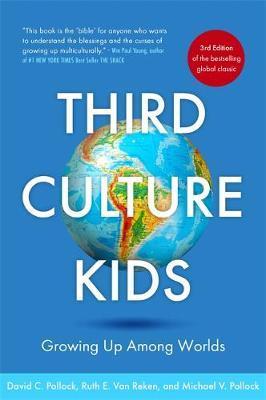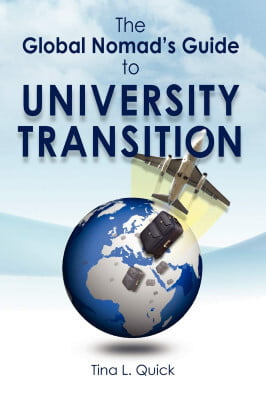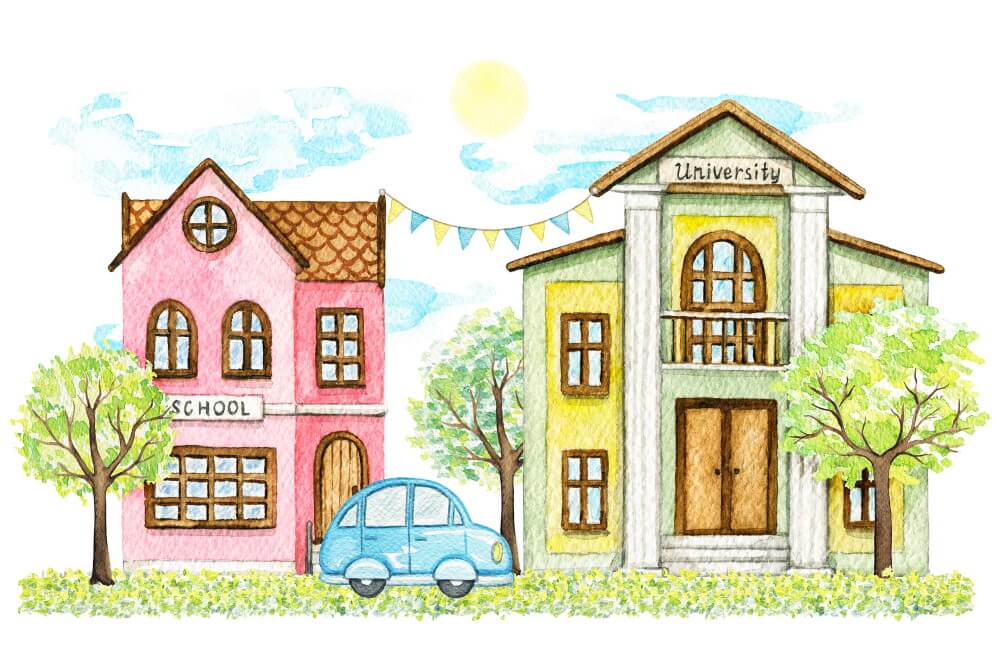By Kristen Anderbeck
Teens who have lived abroad with their families, especially those who have moved internationally many times, are no strangers to change. Most become quite proficient at adapting to new environments in foreign lands. But making the transition to university in one’s passport country is likely the first big transition they make independently, without parents and siblings.
Learn more about Transitions at the World Family Education page about that topic.
At university they will experience new residences, new schedules, new social circles, new challenges in academic coursework, new independence, new DISTANCE from their family (even if their family is nearby for at least a short time). This is scary!
What’s more, they will likely experience Reverse Culture Shock, even in their dream university context. While growing up, they may have returned from overseas every year or two and spent weeks at a time with their relatives and friends, getting to know the home country of one or both of their parents. Thus, it can come as a surprise when they realize they must employ the same strategies for dealing with culture shock in a new foreign country when they are in their passport country, which they thought they knew. It’s no longer a vacation: now they must learn how to live there and relate in that culture long-term.
Realities of the Transition to University for Global Nomads
The reality is that many do not adapt very well to living long term in that familiar-yet-unfamiliar culture, at least according to the data of research on teens from the USA. Unfortunately, the rate of dropping out of university for teens who have spent part of their childhood living abroad is high, as is the rate of transferring to a different university, or even multiple different universities. (From Third Culture Kids: Growing Up Among Worlds)
If a teen physically looks like most others at university, but thinks differently in some ways due to a more global mindset after living abroad, it means that others are less aware of the Reverse Culture Shock that teen might be going through. The teen is known as a Hidden Immigrant, someone who looks like he or she is as culturally competent in that society as anyone else, but is not. The young adult may make numerous cultural faux pas, which can lead to misunderstanding and alienation from monocultural peers or family members. The effects of Reverse Culture Shock can worsen.
Even when the repatriating youngster speaks his or her passport country’s language fluently, gaps in understanding meaning and references, and variations in vocabulary or accent can mark the student as different — at the very time in life in which he or she may be trying hard to fit in and belong.
The amount of difference between host country culture/s and passport country culture can have an impact on how well the student transitions. So, too, does the amount of cultural competency in the passport culture that the student has been able to develop prior to entering university.
Being a Hidden Immigrant often takes a toll on the student’s wellbeing. Indeed, studies have found that students who live internationally and then return to their parents’ home country for university are more likely to experience depression, low self-esteem, unresolved grief, dissatisfaction with relationships/loneliness, rootlessness, struggles in identity development, etc., than other university students. Difficulties have been found to extend well beyond the initial time of repatriation for many youngsters. (Most of the studies relate to American young adults returning to the USA, but research on students repatriating to other countries, including Korea, exists. See the References section below for more information.)
Ways to Facilitate a Good Transition
High school students tend to have very busy schedules no matter where they live in the world. They work hard to get good grades and prepare for exams. They build their portfolio of activities and service projects, and spend hour after hour searching for the right universities and making the best university application possible. They spend as much time as they can with friends, creating memories and forming their identity.
In the midst of this busy-ness of normal secondary student processes, it is helpful for expatriate students and their families to take steps that can mitigate the extra challenges they will face adjusting to university in their passport country.
Over the Years Leading up to University
As the adage states, “knowledge is power.” Reading books and blogs, listening to podcasts, or watching TEDx videos are good ways to be aware of the unique issues globally mobile students experience. Doing an online search of TCKs (Third Culture Kids) can yield helpful information in a variety of media.
Two books that are highly recommended for both parents and students are:

Third Culture Kids: Growing Up Among Worlds
by David Pollock & Ruth Van Reken

The Global Nomad’s Guide to University Transition
by Tina Quick
While a student is still at home with his or her parents, gaining skills in independent living should be the goal for every youngster. When they are learning to adapt to a new environment in a new culture, even if it was the one into which they were born, being familiar with everyday adult tasks will help. Confidence in this area can help students not feel overwhelmed with other adjustments that they must make.
What life skills to prioritize teaching a teenager depends on the passport country. For example, how important is getting a driver’s license for teenagers in the “home” country? Is there more of an emphasis on that than learning to get around on trains and buses, as it might be Singapore? Most US university students live in a dorm setting and eat in a campus dining center for the first year or two of university, but most Australian students do not. They will need to know how to shop and cook for themselves at a younger age.
The following are ideas of independent living skills teenagers can practice while in the “nest.” This is by no means an exhaustive list.
In addition to independent living tasks that young adults gradually need to master, university students will need to prepare for real differences between living with parents or dorm parents, and governing themselves at university. Talking about these differences in advance may help a repatriating student reduce their cultural adjustment load.
For example, it’s good to discuss how there will be no parents around to remind them that they’ve spent enough time on their gaming console/video streaming device, or that they will now be responsible for meeting important deadlines since the notifications for deadlines get sent to the student.
Better yet, make a plan for how to handle distractions, and how to manage details like course registration deadlines and fee payment deadlines. You may also want to explore student scheduling/planning/distraction blocking apps.
Here’s a simple chart highlighting some of the key (non-academic) areas of difference between secondary school and university.
| Secondary School | University | |
| Schedule | structured by institution and/or parents | students must manage their own schedules, including when to wake up and go to bed |
| Level of Freedom | more rules and restrictions set by authority figures | far fewer rules and far more freedoms, even to make bad decisions |
| Living Situation (non boarding school background students) | students follow family routines and manage conflicts within family structure | students negotiate new routines with roommates/housemates and resolve conflicts with peers |
| Planning the Right Courses | parents or a school counselor do much of the course planning | students take initiative to meet with advisors and plot out their degree plans |
Academics deserve special mention because at the university level, the amount of rigor is typically much higher than in secondary school. The more prepared a repatriating student is for the increased expectations academically, the less chance of feeling overwhelmed when they are making all kinds of adjustments in other areas.
Differences to expect university courses are usually found in these areas:
A subset of skills needed for academic success involves technology. These days, having a laptop at university is a necessity. Basic working knowledge of computers will help avoid a sharp learning curve at university, at the same time as adapting to the passport country’s culture, different climate, etc.
Before they leave home, students should be confident in their ability to save and file documents, back up their devices, take screenshots, convert files into different formats, use video chat services, submit writing assignments to a plagiarism prevention service such as turnitin.com, and use file sharing/digital collaboration services such as Google Drive.
Within both areas of developing independent living skills and readiness for university, autonomy support by parents is helpful. Essentially, this means providing support with helping a youngster develop new skills, while encouraging increasing independence in each skill. The goal is to be available when your youngster needs you, but to allow the child to do more and more on his or her own (appropriate to age and cultural setting).
According to researchers at the Academy of Finland who studied 2,000 young people in 2017, “When parents support the independence of their children through educational transitions, they tend to develop greater well-being and self-esteem and have a reduced risk of depression” (Salmelo-Aro 2017). The positive effects of encouraging the autonomy of the young person increased with the age of the child.
The opposite also seems to be true. Even a quick internet search about the effects of “helicopter parenting” on young adults yields a multitude of studies. The research conclusions of studies on the subject show that parental over-involvement can lead to decreased academic engagement, lower academic performance, significantly higher levels of depression and anxiety, less life satisfaction, and increased use of medications.
When teens who are raised outside their parents’ home country already experience so many challenges in adjusting to that country at university, it’s especially important to build up the teen’s confidence in doing things independently — with warm support as needed.
Shortly Before University
In the classic book by Michael Pollock and Ruth Van Reken, the concept is presented of building a “RAFT” for healthy closure in one land and a stronger adjustment in the new land.
R — Reconciliation A — Affirmation F — Farewells T — Think Destination
Not only is this helpful for making a transition to another country together with one’s family, it’s sound advice for a youngster’s transition to university.
Learn more about building a RAFT at the World Family Education page about Returning Home.
Many students living internationally feel most at home around those who are also living outside their parent’s country of origin, other TCKs. Finding a university which has resources for TCKs, such as a campus club or staff mentors, is a good way to help the repatriating student connect with “their people”, people who understand the adjustment issues they are going through.
Since campus resources specific to TCKs are not always easy to find, an international student club may meet the need as well. However, the issues faced by international students, such as obtaining a student visa or having less proficiency in the language of classroom instruction, will be different.
Relatives or family friends or faith-based groups near the university can also be a good resource, especially during holidays or term breaks, or when the student simply needs a break from campus.
The bottom line is that caring community relationships are vital for minimizing the experiences of alienation and depression and grief that are so common among repatriating university students.
Debriefing with others about the cultural and social changes global nomads face in their passport country is very much recommended. Doing this prior to the start of university or early in the first year is recommended. Students who go through such an event are statistically less likely to experience such low dips in Reverse Culture Shock or other difficulties in adjusting to university. (From The Global Nomad’s Guide to University Transition)
Check with:
Visit the World Family Education page about Transition Seminars & Support for more resources.
Before life gets too busy during the actual transition, come up with a plan for family — university student communications. Teens who have lived internationally tend to be already good at keeping touch with their friends. Now they will need to apply the same long-distance communication skills with their family. It might help to set a regular time for chatting so that it becomes a fixture in the calendar on both ends.
Spreading Their Wings
It is a big job, preparing a young person for a successful transition to university. And there are important things to consider when that student is returning to his or her passport country, a country that may feel rather foreign.
Spending healthy doses of time together as a family prior to the transition — teaching skills, laughing, sharing, making future plans, creating warm memories — will go a long way towards the young adult’s ability to fly out of the nest.
Kristen Anderbeck has lived in southeast Asia for many years and successfully homeschooled her children, guiding them to university with full scholarships. Kristen leads the High School Guidance Services team for Asia Education Resource Consortium.
Is your son or daughter preparing to go to university in their passport country? Share with us at the World Family Education community forum.


